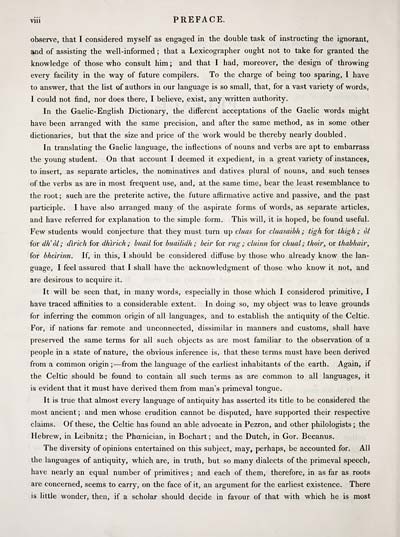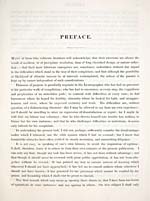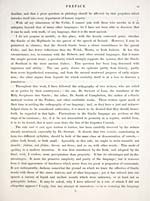Download files
Complete book:
Individual page:
Thumbnail gallery: Grid view | List view

viii PREFACE.
observe, that I considered myself as engaged in the double task of instructing the ignorant,
and of assisting the well-informed ; that a Lexicographer ought not to take for granted the
knowledge of those who consult him ; and that I had, moreover, the design of throwing
every facility in the way of future compilers. To the charge of being too sparing, I have
to answer, that the list of authors in our language is so small, that, for a vast variety of words,
I could not find, nor does there, I believe, exist, any written authority.
In the Gaelic-English Dictionary, the diiferent acceptations of the Gaelic words might
have been arranged with the same precision, and after the same method, as in some other
dictionaries, but that the size and price of the work would be thereby nearly doubled .
In translating the Gaelic language, the inflections of nouns and verbs are apt to embarrass
the young student. On that account I deemed it expedient, in a great variety of instances,
to insert, as separate articles, the nominatives and datives plural of nouns, and such tenses
of the verbs as are in most frequent use, and, at the same time, bear the least resemblance to
the root ; such are the preterite active, the future affirmative active and passive, and the past
participle. I have also arranged many of the aspirate forms of words, as separate articles,
and have referred for explanation to the simple form. This will, it is hoped, be found useful.
Few students would conjecture that they must turn up cliias for cluasaibli ; tigh for thigh ; ol
for (IK ÒI ; dirich for dhirich ; hiiail for buailidh ; heir for rug; cluinn for chual ; thoir, or thabhair,
for bheirbm. If, in this, I should be considered diffuse by those who already know the lan-
guage, I feel assured that I shall have the acknowledgment of those who know it not, and
are desirous to acquire it.
It will be seen that, in many words, especially in those which I considered primitive, I
have traced affinities to a considerable extent. In doing so, my object was to leave grounds
for inferring the common origin of all languages, and to establish the antiquity of the Celtic.
For, if nations far remote and unconnected, dissimilar in manners and customs, shall have
preserved the same terms for all such objects as are most familiar to the observation of a
people in a state of nature, the obvious inference is, that these terms must have been derived
from a common origin; — from the language of the earliest inhabitants of the earth. Again, if
the Celtic should be found to contain all such terms as are common to all languages, it
is evident that it must have derived them from man's primeval tongue.
It is true that almost every language of antiquity has asserted its title to be considered the
most ancient ; and men whose erudition cannot be disputed, have supported their respective
claims. Of these, the Celtic has found an able advocate in Pezron, and other philologists; the
Hebrew, in Leibnitz ; the Phoenician, in Bochart ; and the Dutch, in Gor. Becanus.
The diversity of opinions entertained on this subject, may, perhaps, be accounted for. All
the languages of antiquity, which are, in truth, but so many dialects of the primeval speech,
have nearly an equal number of primitives ; and each of them, therefore, in as far as roots
are concerned, seems to carry, on the face of it, an argument for the earliest existence. There
is little wonder, then, if a scholar should decide in favour of that with which he is most
observe, that I considered myself as engaged in the double task of instructing the ignorant,
and of assisting the well-informed ; that a Lexicographer ought not to take for granted the
knowledge of those who consult him ; and that I had, moreover, the design of throwing
every facility in the way of future compilers. To the charge of being too sparing, I have
to answer, that the list of authors in our language is so small, that, for a vast variety of words,
I could not find, nor does there, I believe, exist, any written authority.
In the Gaelic-English Dictionary, the diiferent acceptations of the Gaelic words might
have been arranged with the same precision, and after the same method, as in some other
dictionaries, but that the size and price of the work would be thereby nearly doubled .
In translating the Gaelic language, the inflections of nouns and verbs are apt to embarrass
the young student. On that account I deemed it expedient, in a great variety of instances,
to insert, as separate articles, the nominatives and datives plural of nouns, and such tenses
of the verbs as are in most frequent use, and, at the same time, bear the least resemblance to
the root ; such are the preterite active, the future affirmative active and passive, and the past
participle. I have also arranged many of the aspirate forms of words, as separate articles,
and have referred for explanation to the simple form. This will, it is hoped, be found useful.
Few students would conjecture that they must turn up cliias for cluasaibli ; tigh for thigh ; ol
for (IK ÒI ; dirich for dhirich ; hiiail for buailidh ; heir for rug; cluinn for chual ; thoir, or thabhair,
for bheirbm. If, in this, I should be considered diffuse by those who already know the lan-
guage, I feel assured that I shall have the acknowledgment of those who know it not, and
are desirous to acquire it.
It will be seen that, in many words, especially in those which I considered primitive, I
have traced affinities to a considerable extent. In doing so, my object was to leave grounds
for inferring the common origin of all languages, and to establish the antiquity of the Celtic.
For, if nations far remote and unconnected, dissimilar in manners and customs, shall have
preserved the same terms for all such objects as are most familiar to the observation of a
people in a state of nature, the obvious inference is, that these terms must have been derived
from a common origin; — from the language of the earliest inhabitants of the earth. Again, if
the Celtic should be found to contain all such terms as are common to all languages, it
is evident that it must have derived them from man's primeval tongue.
It is true that almost every language of antiquity has asserted its title to be considered the
most ancient ; and men whose erudition cannot be disputed, have supported their respective
claims. Of these, the Celtic has found an able advocate in Pezron, and other philologists; the
Hebrew, in Leibnitz ; the Phoenician, in Bochart ; and the Dutch, in Gor. Becanus.
The diversity of opinions entertained on this subject, may, perhaps, be accounted for. All
the languages of antiquity, which are, in truth, but so many dialects of the primeval speech,
have nearly an equal number of primitives ; and each of them, therefore, in as far as roots
are concerned, seems to carry, on the face of it, an argument for the earliest existence. There
is little wonder, then, if a scholar should decide in favour of that with which he is most
Set display mode to: Large image | Transcription
Images and transcriptions on this page, including medium image downloads, may be used under the Creative Commons Attribution 4.0 International Licence unless otherwise stated. ![]()
| Early Gaelic Book Collections > Blair Collection > Gaelic dictionary, in two parts > (14) |
|---|
| Permanent URL | https://digital.nls.uk/79284317 |
|---|
| Description | A selection of books from a collection of more than 500 titles, mostly on religious and literary topics. Also includes some material dealing with other Celtic languages and societies. Collection created towards the end of the 19th century by Lady Evelyn Stewart Murray. |
|---|
| Description | Selected items from five 'Special and Named Printed Collections'. Includes books in Gaelic and other Celtic languages, works about the Gaels, their languages, literature, culture and history. |
|---|

